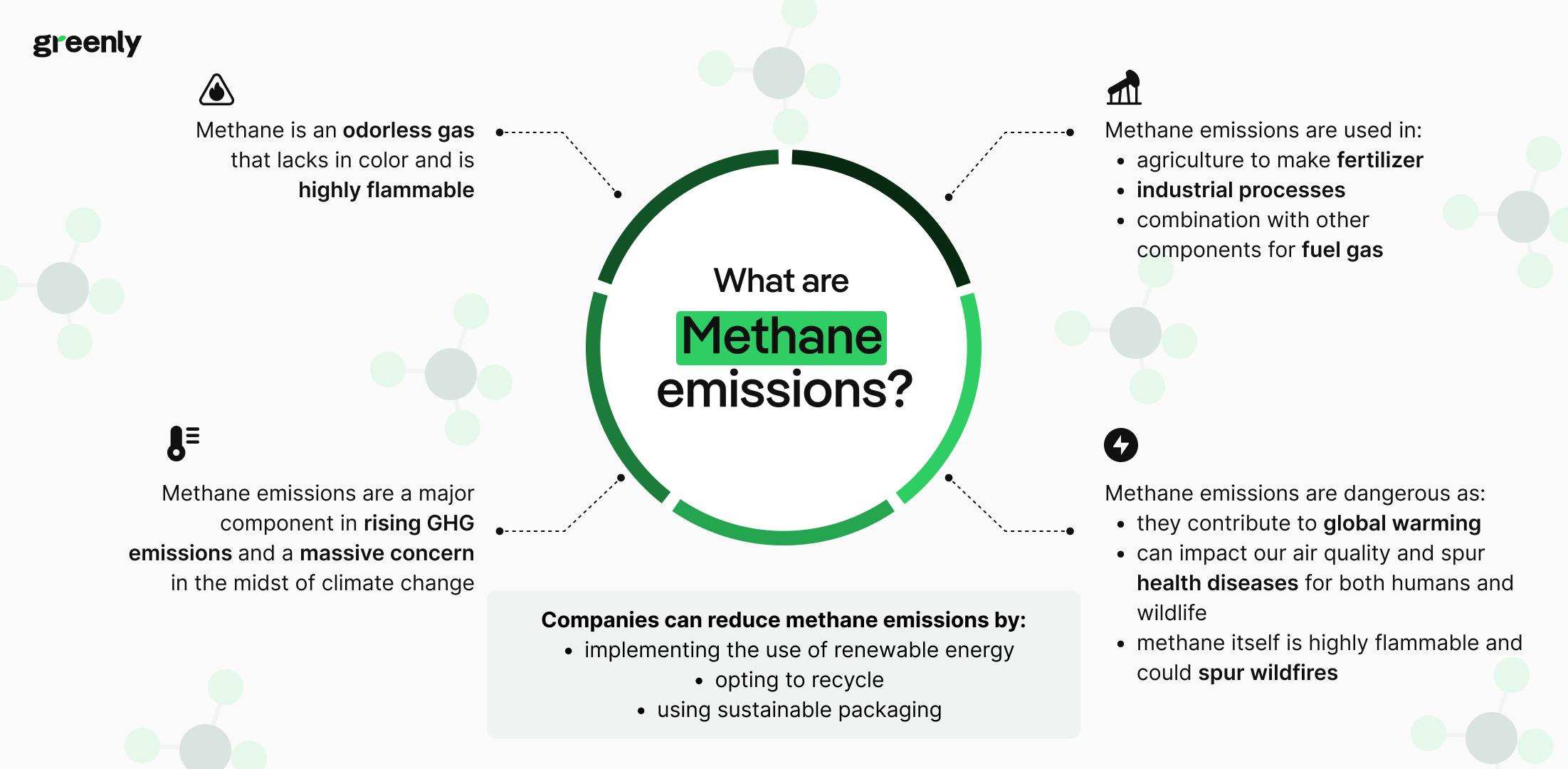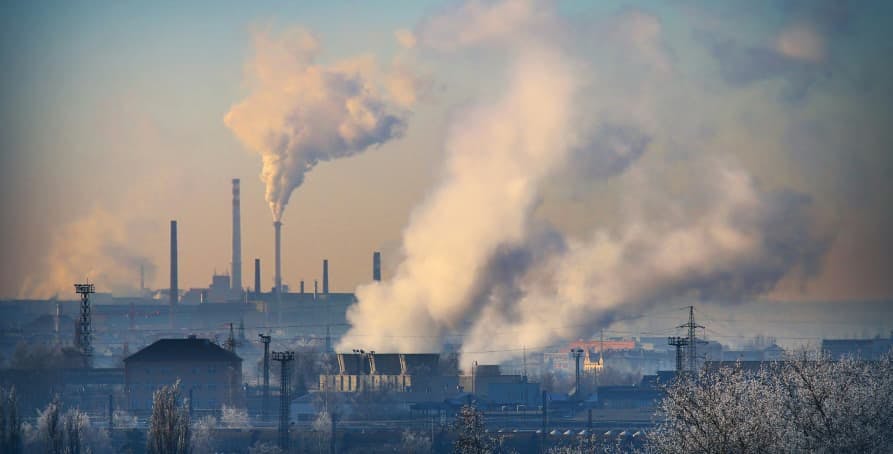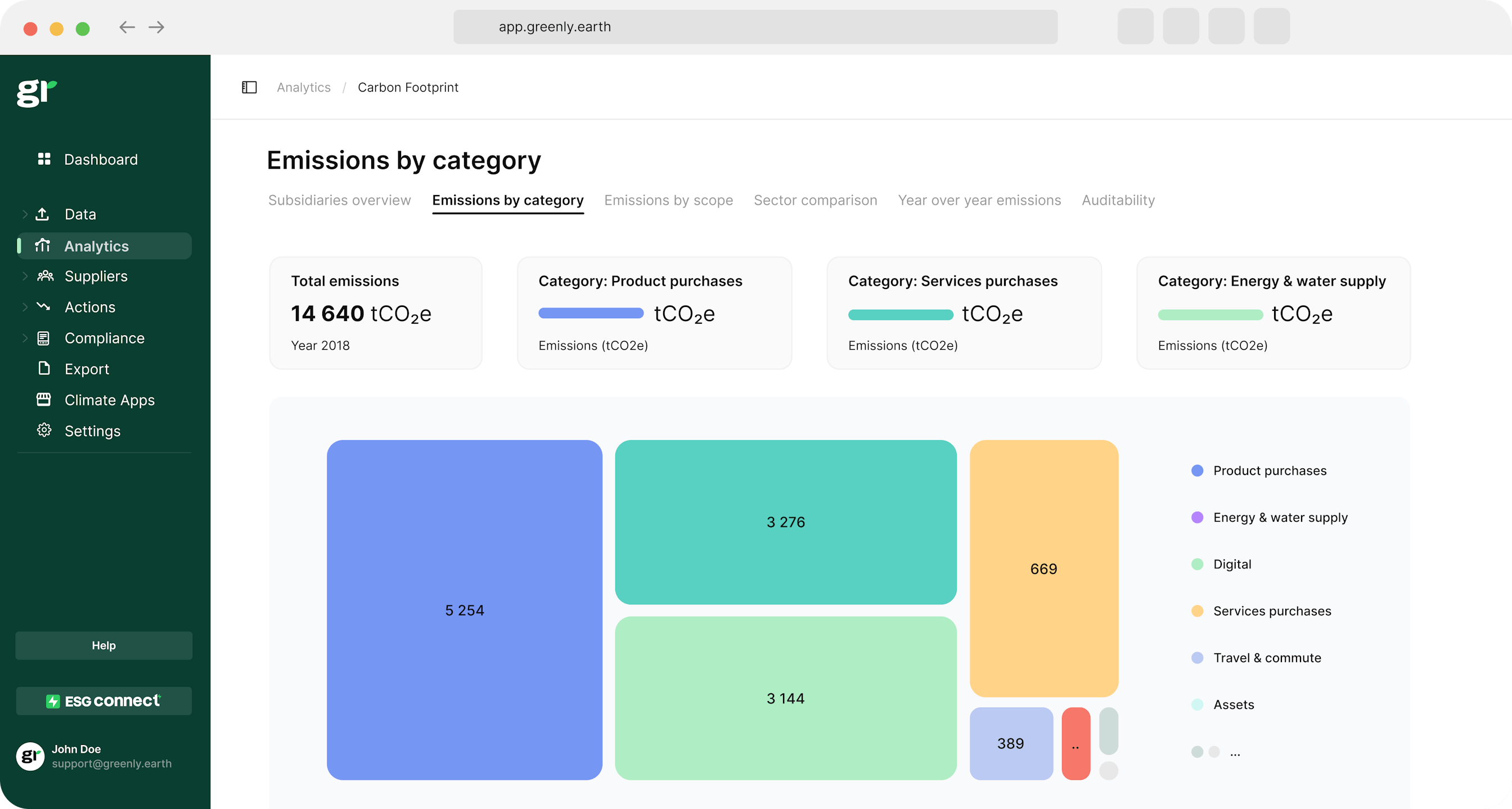ESG / CSR
Industries
What is Methane and How does it Contribute to Global Warming?



There are so many different types of ozone depleting substances that it can become difficult to keep track of which substances contribute to the production of greenhouse gas emissions – such as methane.
Ultimately, it isn’t just about the amount of production a company is responsible for that amounts to excessive emissions, but also what kinds of materials they use that can later emit harmful substances.
Powerful greenhouse gas methane emissions, such as those created by the oil and gas industry, can create potent greenhouse gas and atmospheric methane concentrations that do irreversible damage to our ozone layer and encourage further methane production.
👉 What is methane, why is it a harmful substance, and how does it contribute to greenhouse gas emissions and global warming?
In this article, we'll explain why greenhouse gases such as flammable gas and methane are bad, why burning methane creates anthropogenic emissions, and how predominantly methane contributes to global warming.
What is methane and what are global methane emissions?


💡 Methane is even lighter than air is, and can burn easily when dispersed into the atmosphere – as it is not heavily soluble in water. While methane can be considered a stable alkane, it can be dangerously explosive considering the current properties of the surrounding air – which means methane can and has already accounted for several explosions in areas such as coal mines and collieries.
How Methane is Used in the Natural Gas Industry
Society will often utilize methane or produce methane for the following industrial processes:
- A liquefied natural gas
- Marsh gas
- Fuel gas
- A component of natural gas
- Liquid methane for rocket fuel
More than half of global methane emissions are a result of raising livestock, landfills or other waste from businesses or residences, and from natural gas or methane leaks. This is because methane reacts with high temperatures to help create ammonia for fertilizer in agriculture. Given methane is also a natural gas, it helps to fuel mechanisms such as central air conditioning or industrial plants.
👉 Ultimately, although methane is found in nature – human activity caused by industrialization has made methane a substance that people must remain cognizant of given its explosive potential.
Despite methane being the simplest type of hydrocarbon in the paraffin series – it is the most detrimental greenhouse gas, making it a large culprit behind excessive greenhouse gas emissions.
What are the differences between methane, carbon dioxide, and greenhouse gas emissions?
Greenhouse gas emissions are the emissions produced by greenhouse gasses, including methane.
💡 Greenhouse gasses, also known as GHGs, are the substances that provoke heat to be trapped in the Earth’s atmosphere – and ultimately raise global surface temperatures.
It’s easiest to think of greenhouse gasses like blankets that are being used to warm the Earth. Sure, one blanket won’t cause too much harm – but imagine being swaddled in twenty blankets – you would start to feel a little too warm. That’s precisely how the Earth feels right now due to excessive greenhouse gas emissions, which provoke global warming.
Methane is considered a greenhouse gas as it also contributes to the greenhouse effect and warming of the planet. However, many may get confused on the difference between methane emissions and carbon dioxide emissions – as the two terms are not interchangeable.
👉 Methane has a shorter lifespan than carbon dioxide, but methane is still more likely to provoke global warming than carbon dioxide emissions are – as a reference, methane is almost thirty times more likely to warm the planet than carbon dioxide will.
In addition to how methane releases carbon dioxide, methane also reacts with various hydroxyl radicals – which serve as a form of “laundry detergent” to clean out the rest of the pollutants present in the atmosphere. Methane ultimately destroys these hydroxyl radicals, leaving the atmosphere prone to even more ozone depleting substances. In this way, it is best to think of methane as a pesticide – as methane prevents cleaner air in a similar way to how these insects can prevent an otherwise fruitful harvest.
Therefore, methane is also partly responsible for the current air quality – something that carbon dioxide emissions are not as well-known to elicit. Methane emissions can be considered as a type of greenhouse gas emission as methane is a type of greenhouse gas, and greenhouse gas emissions are the result of emissions from various greenhouse gasses.
Methane vs Carbon Dioxide vs Greenhouse Gas Emissions
| Aspect | Methane (CH4) | Carbon Dioxide (CO2) | Greenhouse Gas Emissions (GHGs) |
|---|---|---|---|
| Global Warming Potential (GWP) | High GWP; 25 times more effective than CO2 over a 100-year period. | Lower GWP compared to methane; used as the baseline with GWP of 1. | Varies; includes gases like methane, CO2, nitrous oxide (N2O), and fluorinated gases, each with different GWPs. |
| Atmospheric Lifetime | Approximately 12 years. | Approximately 100-150 years. | Varies depending on the gas; for example, N2O lasts about 114 years. |
| Sources | Agriculture (e.g., livestock digestion), landfills, natural gas and petroleum systems. | Burning fossil fuels, deforestation, industrial processes. | Varies; includes natural and anthropogenic sources such as agriculture, industry, and energy production. |
| Impact on Climate | Significant short-term warming effect; major contributor to climate change in the short term. | Long-term warming effect; major contributor to climate change over the long term. | Collectively contributes to the greenhouse effect and global warming. |
| Mitigation Strategies | Improving agricultural practices, capturing landfill gas, reducing emissions from oil and gas operations. | Reducing fossil fuel use, enhancing energy efficiency, increasing reforestation. | Combination of strategies targeting each specific gas, including renewable energy adoption, industrial regulation, and carbon sequestration. |

How does methane contribute to global warming?
💡 Methane, while it is a natural gas found in the atmosphere, when mixed in conjunction with industrial activity – can become hazardous and detrimental to living organisms, especially humans, as it forms explosive mixtures, is extremely flammable, and is a major component in the climate change conversation.
Think of methane like someone putting money away in a jar. At first, a couple of dollars or coins in the jar may not seem to amount to much, but after a year of putting one dollar in the jar a day – the person now has over $300 USD. The same goes for methane emissions: while it may not seem like the methane emitted today has a catastrophic effect on the environment, over time – the amount of methane in the air will contribute to the rise in global surface temperature.
Many may view methane as trite, seeing as it is found in nature – but the natural gas has never been more of a threat.
💡 In fact, according to a global methane assessment conducted by the United Nations Environment Program, there is now more than twice the amount of methane in the atmosphere than there was prior to the era of excessive industrial production – with a sharp spike in the amount of methane in the air following the 1980s.
Unbeknownst to most, methane is continuing to build up in the air, which is contributing to the warming of the planet while most companies remain solely focused on reducing their greenhouse gas or carbon dioxide emissions. This makes methane similar to a credit card bill that someone continues to ignore paying off. Over time, that bill will accumulate interest and cost more money to pay off. Methane works in the same way, making its presence a threat to the health of society.
Methane is also a part of the creation of ground-level ozone, which is another gas that can harm human life – despite the fact that these substances are never directly emitted into the atmosphere. Ground-level ozone is produced when various chemicals and compounds are mixed together, often a direct result of the pollution caused by gasoline powered vehicles or the activity from nuclear plants.
👉 In combination with the sun, methane can provoke further ground-level ozone: which is detrimental to fragile ecosystems, forests, and crops given their nature to remain low in the air.
How would society benefit if companies refrained from the use of methane?

What would be the benefits of reducing the use of methane?
If businesses were to become more cognizant of their use or contribution to methane emissions, there could be several benefits – most of which would result in saving lives, but also could help to benefit the business as a whole.
In addition to improving the air quality as a direct result of reducing methane emissions, seeking to stray from the use of methane can also help to improve working conditions and the agricultural sector.
For instance, reducing the amount of methane produced and emitted into the atmosphere can prevent the loss of billions of hours of labor. Also, less methane in the air would reduce the chances of ground-level ozone – meaning that over 25 million crops could be saved in the process.
Mitigating methane emissions is bound to have nothing but beneficial effects on the environment and society – what can companies do to avoid methane emissions?
How can companies reduce their use of methane and mitigate global warming?
For instance, unbeknownst to most, there are now new technologies that can help to detect methane emissions. These technologies are able to search for the oils and natural gasses being used, such as at production sites or transportation used for delivery – and can ultimately detect methane emissions. This can help businesses seeking to reduce their methane emissions, as they are not as easily discovered or calculated as other types of emissions.
This improved knowledge and technology to discover methane emissions is the first step in being able to reduce them.
💡 Mitigating methane is more important than ever, as the United States remains as the second largest contributor to greenhouse gas emissions – effort needs to be taken swiftly to avoid further environmental damage.
One of the most effective ways to reduce methane emissions is to implement climate legislation. Governmental action such as this has been growing across the United States, with legislation such as the Inflation Reduction Act of 2022 being implemented late last year to incentivize Americans to shift to the use of clean energy and reduce emissions.

The Environmental Protection Agency, otherwise known as the EPA, is also getting more serious about reducing methane emissions – implementing stricter cuts to help mitigate their harmful effect on the environment. In general, various greenhouse gas emissions can be reduced when companies seek to decrease their dependence on fossil fuels like oil, gas, and coal in addition to shifting to the use of renewable energy sources – like solar panels or wind turbines.
However, it should be noted that reducing methane emissions isn’t the responsibility of businesses alone – but the average citizen, too. Everyone can help to reduce methane emissions through small but effective measures: such as by recycling more, opting for an electric car, or switching to more sustainable clothing or cosmetic brands.
Remember, methane emissions are worse in the long run as opposed to other types of emissions such as those created by carbon dioxide – meaning paying attention to the amount of methane being produced or interfering with other substances produced by your company can greatly help to reduce emissions and avoid the globe from getting warmer than it already is.
What about Greenly?
If reading this article about methane and how it contributes to global warming has made you interested in reducing your carbon emissions to further fight against climate change – Greenly can help you!
It can be difficult to alter your business model to prevent contributing to the production of substances that contribute to greenhouse gas emissions like methane, and Greenly’s got you covered – click here to book a demo and learn more about how we can help you to meausre and reduce your various scope emissions.
Greenly can help you make an environmental change for the better, starting with a carbon footprint assessment to know how much carbon emissions your company produces.





